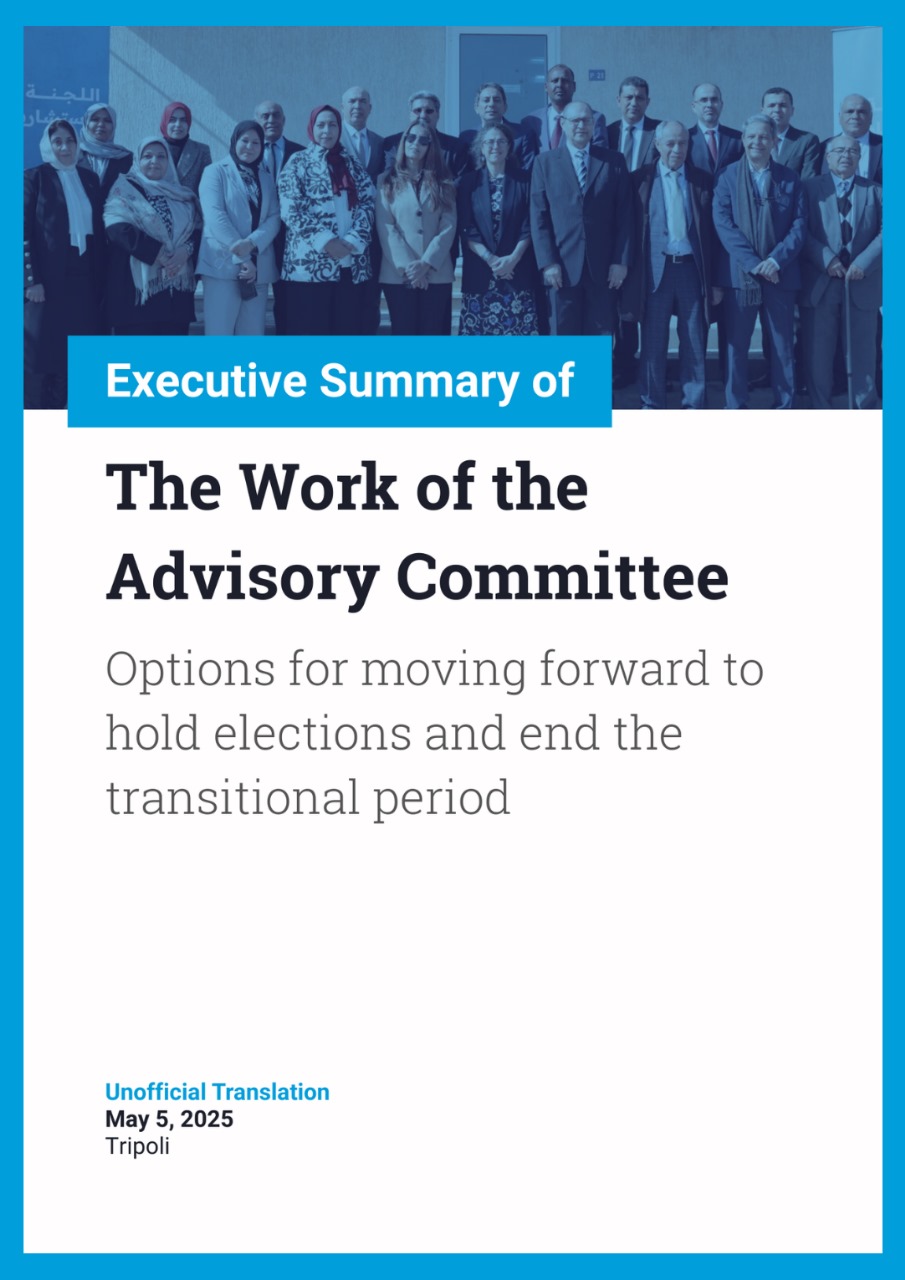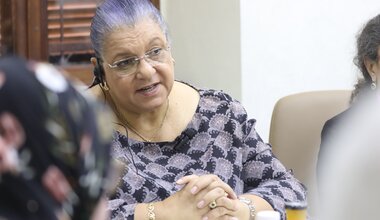Martin Kobler's Statement to the Security Council
“Return to Politics”
Martin Kobler, Special Representative of the Secretary-General and Head of UNSMIL
19 April 2017, New York
Thank you, Madame President.
Madame President, Distinguished Members of the Council
At the outset, I would like to congratulate the United States of America on presiding over the Security Council this month.
Members of the Council have received the latest Report of the Secretary-General on Libya.
In my remarks, I would like to concentrate on some strategic lines and provide recommendations for consideration by the Council.
Forging the Elements of Unity
Madame President,
1. Today, it is more important than ever to forge unity within Libya. Prior to the signing of the Libyan Political Agreement in Skhirat, Libya was a deeply divided country. The broad endorsement of the Libyan Political Agreement by Libyan stakeholders, signed with hope and confidence on 17 December 2015, continues today.
2. The international community also continues to strongly support the agreement and its institutions, and recognize the Presidency Council as the sole national executive authority. The statements of P5 ambassadors to Libya, the political support and engagement of neighbouring countries, and the formation of the Quartet, of the African Union, League of Arab States, European Union and the UN are tangible reflections of international cohesion and commitment. We all share the same vision, we all share the same roadmap.
3. Both Libyans and the international community support the Agreement.
Yes, it can be amended.
But no, there is no alternative, there is no plan B.
And there is no need for one.
If the parties do not uphold their responsibility in the Libyan Political Agreement, there is no reason to think that they will have any greater commitment to an alternative agreement.
4. There are positive signs elsewhere too. The fight against terrorism is largely successful in Sirte and in Benghazi. Daesh no longer controls territory in Libya. And this is a significant achievement toward the end of the Islamic state in Libya. The security situation in Tripoli is at least contained.
5. Looking at the economy, oil production has increased and has potential to grow further. The National Oil Corporation has achieved much and demonstrates the need to maintain the unity of sovereign institutions. Budgetary resources have been released by the Central Bank of Libya, including salaries in all parts of the country.
The Drivers of Dissent
Madame President,
Despite of what I have said we should be honest enough to see that the optimism and confidence of Skhirat has faded. Instead I see frustration, disappointment, sometimes anger, and often it is justified.
The sharp horizon established by the Libyan Political Agreement has blurred and the path forward is no longer clear for many.
Today, uncertainty has contributed to fragmentation and dissent, contributing to a dangerous political power vacuum.
Violent clashes, social unrest, increasing criminality remain common in too many parts of Libya.
The institutions of the Libyan Political Agreement must deliver if they are to maintain credibility and legitimacy.
The divisions in many of the institutions have impacted their ability to govern.
Instead of functioning for the good of the nation, many began to perceive the power sharing arrangements through the interests of one group over the other.
The Results of Division
Madame President,
The results of these divisions are setting Libya on a worrying path.
Public services, including access to electricity, health, education, water, are failing many.
The economy continues to decline. The GDP has lost over half its value since 2012.
The lack of liquidity prevents Libyans from accessing their salaries. The dinar is losing value. The shadow economy and rampant corruption are growing.
Political divisions also threaten the cohesiveness of the sovereign financial institutions such as the Central Bank, the National Oil Corporation and the Libyan Investment Authority. It is difficult to produce a realistic common budget for the whole of Libya.
The political vacuum complicates efforts to create a united security force and has encouraged some to advocate for a military solution to the Libyan crisis.
Madame President,
History does not tolerate a power vacuum. Armed groups are gaining power and Libya is witnessing new and heightened violence.
The gains made against terrorist groups, including in Benghazi and Sirte, will ultimately be lost be if some actors continue to strive for power at the expense of institutions and civil society.
The competition for control of national resources will trigger renewed violence if the root causes are not addressed.
The use of violence to obtain short-term objectives must end.
It is time to go back to politics.
It is time to address the core issues.
And it is time to go back to the spirit of Skhirat.
Madame President,
Having worked on Libya since the signature of the Libyan Political Agreement, I am convinced that Libya will not solve its problem alone. It needs strong, united, consistent, robust and concrete support of the international community.
- Action and commitment, not only papers and meetings and workshops
- Partnership, not interference
- Antibiotics not aspirin
Please allow me to suggest seven brief points on the way forward for the council’s consideration.
Seven steps to peace
First: The Libyan Political Agreement must remain the framework for a negotiated settlement.
And I am encouraged that all-important stakeholders and the overwhelming majority of the Libyan population share the same opinion. Let us build on this consensus.
The Prime Minister, the President of the House of Representatives both confirmed their commitment, as did the Commander of the Libyan National Army, Field Marshall Haftar, during our meeting last Thursday in Benghazi. The Head of the State Council expressed his agreement, as have almost all representatives of significant institutions and constituencies.
The agreement is not perfect. There is a consensus that amendments are needed.
And these amendments can only be done by the Libyans themselves.
We are working to create consensus on the mechanism to enable the amendment.
And this process must be inclusive and those deciding must have the capacity and the commitment to implement their decisions.
Second: All security actors must refrain from any action that may trigger violence and escalation.
The temperature in Libya must lower if the political discussions are to resume.
Efforts to expand control through violence are short-sighted and counterproductive.
I am particularly concerned about developments in southern Libya, both military and humanitarian. The much-neglected South just cannot take more.
There will be no unity through violence. Parties need to step back, and talk.
Third: The security track to stabilize the situation and create conditions for the formation of a unified security apparatus must be urgently reinvigorated.
While progress on security is most effective when combined with advances on the political track, confidence-building steps must be taken now and immediately.
The formation of a committee in Tripoli to supervise the ceasefire is a good basis on which to move forward with more structured security arrangements for the city and means to strengthen the authority of the Presidency Council.
Fourth: The economy and the financial situation of the country needs to be stabilized.
Agreement on a budget framework for 2017 was a significant step forward. However, budgetary and public finance mechanisms must improve to ensure unified and equitable financing of the services and economy, with funds distributed fairly and transparently to all regions of Libya.
In this regard, I urge for a more constructive cooperation between Libya’s financial and economic institutions and the Presidency Council.
Fifth: National Reconciliation must be integrated decisively at all levels.
The ability of Libyan leaders to mediate local ceasefires is a great asset and has prevented many sparks from creating fires.
Libyans will soon start a comprehensive bottom-up national reconciliation initiative supported by UNSMIL.
Six: Public services, security, governance start improving at the local levels.
In a country with a legacy of weak national institutions, local authorities remain among the most respected and effective actors.
We must support them.
Democratically-elected mayors must be given authority, funds and responsibility.
In this context, it is important that international partners are prepared to support the Presidency Council, if requested. Also to deploy expertise on the ground, not only outside, inside Libya and on the ground.
My seventh and last point is particularly important: it is my wish that the international community moves beyond containment.
The focus on the fight against terrorism and migration alone is not enough.
Migration and terrorism are symptoms not the root causes.
I am grateful for the many initiatives and efforts of, in particular, neighbouring countries and regional organizations over the last weeks and months to bring political and military stakeholders closer together.
Now, I believe it is time for the United Nations to take the lead again.
The UN is uniquely placed in Libya.
However, we need the united support of the Security Council and the wider international community.
The women and men of Libya, young and old, its wise elders and its vibrant youth, deserve a better life and they deserve it now.
Madame President,
Distinguished Members of the Council,
I would like to once again thank the Security Council for its unwavering support to my colleagues and myself. And Mr Ambassador, I would like to thank you, the Presidency Council and all the stakeholders all over Libya, in East, the West, in the South, all over the country. I thank you very much for your support for the Libyan Political Agreement and finally for the opportunity and confidence you have given to all of us at UNSMIL to serve the people of Libya.
Thank you very much.
 United Nations Peacekeeping
United Nations Peacekeeping UN
UN








